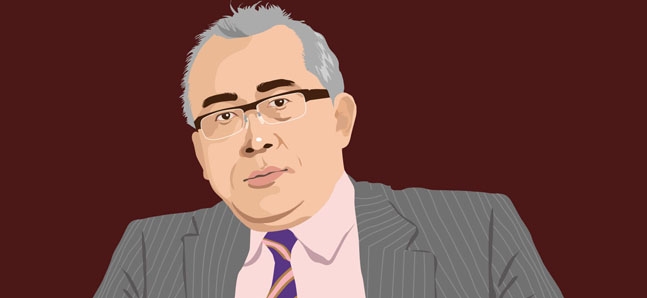The Hot Seat: Hiroshi Mizohata
Time Out talks to the Commissioner of the Japan Tourism Agency

イラストレーション: Haruna Nitadori
Posted: Wed Feb 23 2011
On January 4, 2010, Hiroshi Mizohata accepted the position of Commissioner of the Japan Tourism Agency. Known for having an instrumental role in the establishment of Oita’s Ritsumeikan Asia Pacific University, Mizohata also established Oita as a host city for the 2001 FIFA World Cup, and brought Oita Trinita to victory during the 2008 J League Cup. Time Out Tokyo caught up with the man himself to find out what, as the Commissioner of the Japan Tourism Agency, he’s aiming to accomplish next.
Congratulations on winning an award at the 2010 Best Dresser Awards ceremony.
Thank you! I’m honoured to have so many people talking about it.
Where do you do your clothes shopping?
Mainly from places like discount stores, where you can buy shirts for as little as 1990 yen — which is where I bought the shirt I’m wearing now. However, the way to look cool is to train your body. If you have a well-toned body, you can look good in anything [laughs].
So, what can you tell us about tourism in Japan?
At the moment, Japan is the thirty-third most visited country in the world. However, with such an abundance of natural beauty and wonderful tourist attractions, we really ought to rank higher. The problem is that the world doesn’t yet know enough about what we have to offer; we haven’t made enough effort in publicizing and promoting tourism in Japan. At the very least, we’d like to have the same kind of the numbers visit us as visit the UK — in the region of about 30 million a year. The UK and Japan are both island nations with tourism industries supported by airlines, so reaching the same kind of numbers that the UK sees each year is the initial goal.
From north to south, Japan is blessed with a range of different climates and a wealth of natural beauty and attractions; it’s important to raise awareness of these things. Each area needs to unearth their own treasures and take a renewed sense of pride in what they have to offer. After that, we need to find the best way to promote these things to the outside world.
But trying to change the way people view things can be extremely difficult...
In order to revitalize the industry, both our major cities and our rural areas need to turn their gaze from domestic markets to foreign markets. If they don’t, then it’s only ruin that lies ahead. That’s why it’s so important that each rural area takes responsibility in changing people’s views. It’s a process that’s going to take time, but if we don’t take up the challenge we’ll be forever blaming failure on outside factors, such as things like a dwindling population and a bad economy, without ever actually moving forward. If we can revitalize our rural areas with a mindset that thinks globally and acts locally, then it’s not just Japan’s tourism industry that will reap the benefits but also all of our other industries as well. Plus, it’s not at all difficult to feel affection for the place in which ones lives. If we endeavor to do so, we can make a change.
Can you give me an example of how you've managed this in the past?
Starting from nothing, in Oita, I put together a J League team and pushed them to win the J League Cup. I kept on saying the same thing: "From Oita to number one in Japan, to number one in the world!" The players went from being happy simply to see anyone turn up to see them play, to saying that they wanted everyone to come to the practice grounds and see them play. As a result, gradually, people started to come. Some came bearing water for the players and others told us that supporting the team had given their lives new meaning.
It was a real sight to be seen. If you came to the stadium, you’d see grandpas and grandmas, together with young supporters, all standing together as one to support the team. There was a real community feel to it. To me, such scenes depicted the image of our success. Making the most of my leadership skills, it was possible to defeat the opposition and show people what’s possible. If the leaders in each of our rural districts come forward and act, they can revitalize their areas. The problem is inspiring the leaders.
Is there a way to create leaders? Where will these leaders come forward from?
Leaders often come from outside the areas in which they lead. I’m not originally from Oita. When a person decides to lead, they have to make certain changes. However, if all they do is make small changes, then nothing really moves forward; the only way to really make progress is to smash through the barriers, which can often lead to criticism, defamation and jealousy. When things go well, everyone is pleased, but when things go badly, there’s a world of criticism to face, and when that happens, it takes a considerable degree of both emotional and physical strength to carry on. It’s taken me about ten years to bring Oita this far. In the course of getting things done I’ve been separated from family, used up all of my own money, and eventually I’ve even had to give up my position as a public servant.
A leader mustn’t be someone who’s blinded by self-interest — that’s an inviolable rule. A leader needs to be someone who heads in what they believe to be the right direction. However, that’s tough. Likely as not, you’ll have to hold a steady course regardless of any previous mistakes and despite people calling you an idiot or saying that you’ve lost the plot. A dream is something that, by its very nature, appears absurd to begin with. However, in the course of gaining support, the absurdity of the dream begins to disappear, and when everyone pulls together to support you, the dream can finally turn into a reality. An idea that might take 10 or 20 years to realize starts with just about everyone telling you it’s impossible and can’t be done. Changing people’s opinions is the key to success.
I’m like a zombie in that, however many times you try and beat me down, I’ll keep coming back to life again and again [laughs]. If you’re going to do something, you’ve got to continually assure everyone involved that you’re aiming to be the best in the world. When everyone realizes that you’re serious, and everyone is fighting on your side, you’ll begin to win battles. Once that starts to happen you’ve got to sympathise with the losing side, who, despite feeling frustrated about having been beaten, will respect you for having won. After that, you have to move forward and face the next battle. If everyone does his or her best, then everybody in Japan will prosper. I think that to live means to fight.
But, nowadays, kids in nurseries and elementary schools are being taught that winning isn’t everything.
When I was a kid, my parents put a globe in front of me and told me, "This is it, so go out there and give it your best shot". They’d say, "If you’re going to compete, make sure you win and never lose", and "fight until you come out on top". If I whined and complained, they’d tell me to "die". They’d say, "Dogs show respect, but you don’t even do that. You’re worse than a dog. You may as well die". My parent’s were severe, but there’s a fine line between affection and severity. Telling someone to die can be really effective. They really believed that people shouldn’t whine and complain about things.
Once, when circumstances were really dire, I felt like my world had completely collapsed around me. When things go really wrong you’re liable to public execution. When you’re driven to the wall, that’s when things get really tough. However, remembering my parent’s faces spurred me on. Receiving such a harsh upbringing is what drives me to think of life as a challenge, which is what keeps me motivated. Despite a life full of mistakes, I keep trying my best to succeed, which is exactly why it’s so important to me that everyone else keeps trying to succeed as well.
Encouraging foreign travellers to come and see what Japan has to offer in the hope that the corresponding influx of money will help boost Japan’s economy is all well and good. However, when it comes to raising tomorrow’s leaders, the number of young people in Japan who care little for anything further than what’s right in front them is increasing. The number of young Japanese people travelling abroad each year is decreasing. Would you agree that we also have to do something to rectify that situation as well?
The number of outbound Japanese and inbound foreigners are two halves of the same whole. We have to direct more of our energy to things outside of Japan. Driven by a desire to see and learn about new things, I’ve travelled to 104 countries. I’ve a carnivorous appetite for new ideas, which is why I’m so energized by people, objects and money. I often say that I plan to become Japan’s turbo engine — a person capable of supplying the energy required to power the people, objects and money that make up tourism. If you haven’t got the power to travel abroad then you won’t be able to inspire others to come here either. It’s really important to be driven by interests, to find things amusing and to let your emotions run wild. That’s something I feel very strongly about. Be honest with your true self. That’s what’s at the heart of tourism. When you can let your emotions run free and say that something you see or feel is "really great", or, "beautiful", or when you think, "wow, I wish I could show this to everyone back to home", that’s when you’re free of all inhibition.
What’s important is revitalizing our country! I’ve lived a pretty harsh life and, since you never know how long you’ve got left, I try and live each day to its fullest. For all I know I might drop dead any minute.
I think you’ve probably got nothing to worry about [laughs].
Incidentally, there’s a list named Nihon no Utsukushii Mura 33 Sen (The 33 Most Beautiful Villages in Japan) that highlights a number of interesting points. For example, compared to our cities, our villages are crammed full of culture. I think that, in many respects, the fact that they’re less populated could be used as a real selling point. Plus, they’re also easy to find your way around.
I get the feeling that, regardless of whether or not they can speak any English, the majority of elderly folk living in those kinds of villages are probably not likely to be phased by the challenge of having to communicate with outsiders.
There are still some village folk who’ve never seen a foreigner in the flesh before. However, when those people do lay eyes on someone from abroad for the first time, their faces light up with welcoming smiles. They don’t need words to communicate their feelings. Whenever I’ve travelled abroad, I’ve always found body language to be more than enough.
Once, when I was back in university, I got into some trouble in Mumbai, in India — it was pretty scary. I let my guard down, went drinking and ended up a captive, unable to return home. In an effort to escape, I left my wallet on the table and, on the pretense of going to the lavatory, made a run for it. My passport was in my pocket but that was all I was left with. Desperate to get away, I just ran as fast as my legs would carry me. Finally, I ran down a side street and hid myself in an alleyway, not moving an inch. The next day, since I had absolutely no money, I went looking for a job and found one on a market stall selling fruit. I worked there for about ten days until, by chance, just as I was beginning to get some money together, I met a fellow Japanese tourist who I managed to persuade to lend me 40,000 yen, which, together with the money I’d managed to save, was just about enough to buy a flight back to Japan.
That’s a pretty amazing story!
Thanks to that experience, I realized that traveling to various places means meeting a number of different people and experiencing a wealth of different emotions, which can only really be a positive thing to do. When I was a kid, I spent some time in France and Italy and I think that seeing different parts of the world whilst I was still growing up made me want to see as many different places as possible. I guess you could say that traveling is my lifework. When you’re feeling small or down, one of the best things to do is go and see the big wide world. I’ve also spent money to build a school in Vietnam. As much as I can, I want to help the world’s people.
Having had a number of experiences, successes and failures, I get the feeling that you’re exactly the type of person who’s ideally suited to help raise tomorrow’s leaders.
I think failing at things gives you an ability to predict what will or won’t work in the future. I want to support the type of people who don’t give up on something midway. Many people say that today’s youngsters lack enthusiasm, however, if you know where to look, there are still a vast number of youngsters who are really trying — in farming, for example — and it’s my job to make a good example of these people. If you know any inspired youngsters, just tell them where to find me. Together with the help of our younger generations, let’s endeavor to help make Japan a better place for everyone.
Tags:
Tweets
- About Us |
- Work for Time Out |
- Send us info |
- Advertising |
- Mobile edition |
- Terms & Conditions |
- Privacy policy |
- Contact Us
Copyright © 2014 Time Out Tokyo















Add your comment